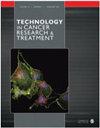抗血管生成药物对非小细胞肺癌患者 COVID-19 严重程度的影响
IF 2.7
4区 医学
Q3 ONCOLOGY
引用次数: 0
摘要
导言:2019年冠状病毒病(COVID-19)大流行重塑了肿瘤学实践,但抗血管生成药物对非小细胞肺癌(NSCLC)患者COVID-19严重程度的影响仍不清楚。患者和方法:我们开展了一项回顾性研究,涉及 166 名 COVID-19 阳性的连续 NSCLC 患者,旨在确定抗血管生成药物对疾病严重程度的影响,疾病严重程度由严重/危重症状、入住重症监护室(ICU)/插管和死亡率结果定义。采用单变量和多变量逻辑回归模型确定了风险因素。研究结果在参与者中,有 73 人服用过抗血管生成药物(称为抗血管生成疗法(AT)组),93 人未服用过(非 AT 组)。比较分析表明,两组患者的严重/危重症状发生率(21.9% vs 35.5%,P = 0.057)、入住重症监护室/插管率(6.8% vs 7.5%,P = 0.867)或死亡率(11.0% vs 9.7%,P = 0.787)无明显差异。然而,恶化结果的高危因素包括年龄≥60岁(几率比(OR):2.52,95%置信区间(CI):1.07-5.92)、东部合作肿瘤学组表现状态为2或更高(OR:21.29,95% CI:4.98-91.01)、慢性阻塞性肺病(OR:7.25,95% CI:1.65-31.81)、高血压(OR:2.98,95% CI:1.20-7.39)和使用免疫球蛋白(OR:5.26,95% CI:1.06-26.25)。结论我们的数据表明,使用抗血管生成药物可能不会加剧 NSCLC 患者 COVID-19 的严重程度,这表明即使在大流行期间也可以安全使用这些药物。本文章由计算机程序翻译,如有差异,请以英文原文为准。
Impact of Anti-angiogenic Drugs on Severity of COVID-19 in Patients with Non-Small Cell Lung Cancer
Introduction: The 2019 coronavirus disease (COVID-19) pandemic has reshaped oncology practice, but the impact of anti-angiogenic drugs on the severity of COVID-19 in patients with non-small cell lung cancer (NSCLC) remains unclear. Patients and Methods: We carried out a retrospective study involving 166 consecutive patients with NSCLC who were positive for COVID-19, aiming to determine the effects of anti-angiogenic drugs on disease severity, as defined by severe/critical symptoms, intensive care unit (ICU) admission/intubation, and mortality outcomes. Risk factors were identified using univariate and multivariate logistic regression models. Results: Of the participants, 73 had been administered anti-angiogenic drugs (termed the anti-angiogenic therapy (AT) group), while 93 had not (non-AT group). Comparative analyses showed no significant disparity in the rates of severe/critical symptoms (21.9% vs 35.5%, P = 0.057), ICU admission/intubation (6.8% vs 7.5%, P = 0.867), or death (11.0% vs 9.7%, P = 0.787) between these two groups. However, elevated risk factors for worse outcomes included age ≥ 60 (odds ratio (OR): 2.52, 95% confidence interval (CI): 1.07-5.92), Eastern Cooperative Oncology Group performance status of 2 or higher (OR: 21.29, 95% CI: 4.98-91.01), chronic obstructive pulmonary disease (OR: 7.25, 95% CI: 1.65-31.81), hypertension (OR: 2.98, 95% CI: 1.20-7.39), and use of immunoglobulin (OR: 5.26, 95% CI: 1.06-26.25). Conclusion: Our data suggests that the use of anti-angiogenic drugs may not exacerbate COVID-19 severity in NSCLC patients, indicating their potential safe application even during the pandemic period.
求助全文
通过发布文献求助,成功后即可免费获取论文全文。
去求助
来源期刊
CiteScore
4.40
自引率
0.00%
发文量
202
审稿时长
2 months
期刊介绍:
Technology in Cancer Research & Treatment (TCRT) is a JCR-ranked, broad-spectrum, open access, peer-reviewed publication whose aim is to provide researchers and clinicians with a platform to share and discuss developments in the prevention, diagnosis, treatment, and monitoring of cancer.

 求助内容:
求助内容: 应助结果提醒方式:
应助结果提醒方式:


